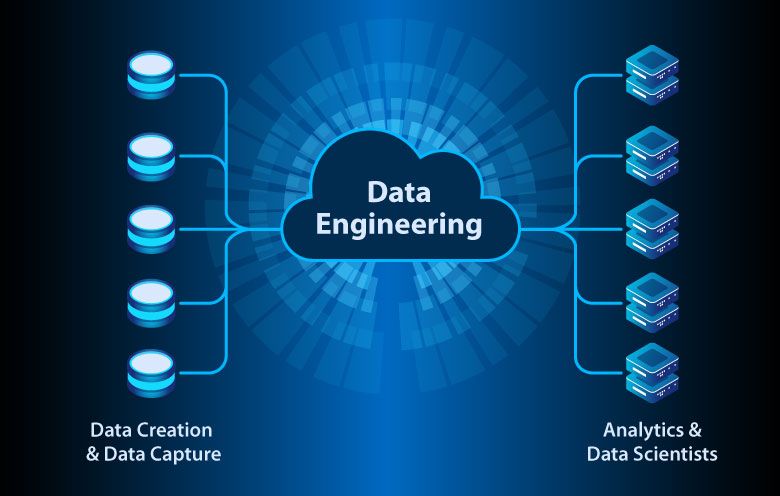Data engineering is particularly crucial in the era of big data, where businesses have access to vast amounts of information from various sources. According to Dice’s number of data engineering job listings has increased by 15% between Q1 2021 to Q2 2021, up 50% from 2019. Also, data engineering can help scale your business and gain valuable insights.
But what exactly is data engineering? What skills are needed to manage big data? We asked IT professionals from FINGO – a Software House from Poland that creates bespoke business software solutions compliant with financial regulations.
What is data engineering?
During the 1980s, the term “information engineering” was used to describe the process of database design and the integration of software engineering principles into data analysis. In the following decades, particularly from the 1990s to the 2000s, the concept of “big data” emerged with the widespread adoption of the Internet. However, during that time, professionals working in this field, such as database administrators (DBAs), SQL developers, and IT professionals, were not commonly referred to as “data engineers.”
In the present day, computers play a role in managing data within businesses. It is important to recognize that various activities may be silently collecting and tracking new information related to specific user interactions. This vast amount of accessible data presents opportunities for businesses to perform extensive analysis and gain insights to improve various aspects, including cost-related processes, customer feedback, or global public health.
According to a Gartner, Inc. survey, 80% of executives think automation can be applied to any business decision. So, data engineering concepts are strongly associated with business. Moreover, the survey shows that “enterprises are shifting away from a purely tactical approach to AI and beginning to apply AI more strategically,” by Erick Brethenoux, the VP analyst at Gartner.
What is data engineering?
Data engineering refers to the process of designing and building systems that enable users to gather and analyze raw data from diverse sources and formats. These technologies empower users to discover valuable insights and leverage data platforms for the success of their businesses.
Large organizations often employ various types of operations management software, such as ERP (Enterprise Resource Planning), CRM (Customer Relationship Management), and production systems. These systems contain databases with different types of information. Data engineering aims to simplify the analysis and utilization of data for effective decision-making. This involves collecting data from multiple sources, organizing it in databases capable of handling large volumes of information, structuring the data through processes like language interoperability for efficient use, and presenting it in a user-friendly manner.
Today, the role of a data engineer is crucial for every business. Organizations adopt data engineering practices to address operational challenges and improve their processes. Some of the issues that data engineering can help companies to tackle include:
- Make data easily accessible and available for data scientists and business intelligence engineers
- Design and configure databases
- Optimize the big data system architecture of companies
Why are data engineering skills needed in the project?
Many data engineering pipelines connect data in most organizations, and each system often employs a unique technology and has an individual owner inside the company. They take the information about customers and analyze data.
- Data engineering skills are crucial in projects for several reasons. Let’s examine the responsibilities of a data engineer to understand why their expertise is needed:
- Design and implement effective database solutions. This ensures that data is organized and accessible for analysis and decision-making.
- Identify structural database needs. This helps optimize data storage and retrieval processes.
- Ensure compliance with regulations. This is crucial for data privacy, security, and governance.
- Install and organize information systems. This includes configuring databases, integrating data sources, and establishing data pipelines.
- Produce database design reports. These reports help in decision-making and ensure alignment between technical solutions and business requirements.
- Manage data migration. This ensures a smooth transition and data integrity.
- Monitor system performance. This includes performance tuning, data validation, and addressing scalability issues.
- Provide support and respond to failures. This minimizes downtime and ensures data continuity.
The broad range of responsibilities handled by data engineers highlights their essential role in projects. Data engineering is particularly crucial in the era of big data, where businesses have access to vast amounts of information from various sources. Data engineers help manage, process, and integrate this data to enable meaningful analysis, decision-making, and business insights.
What about the data engineering process?
The term “data engineering” encompasses a set of procedures aimed at transforming a significant amount of unstructured data into a structured and usable output for professionals like analysts, data scientists, and machine learning engineers. In most cases, data processing follows an end-to-end workflow.
Data ingestion, or acquisition, involves transferring data from diverse sources, including SQL and NoSQL databases, IoT devices, websites, streaming services, and more, into a target system where it can be further transformed for analysis. The data can be structured or unstructured and may arrive in various formats.
Data transformation involves cleansing the data by identifying and rectifying errors and duplicates, normalizing it to ensure consistency, and converting it into the required format for downstream processing and analysis.
Data serving refers to providing the transformed data to end users, such as a data science team, dashboard, or business intelligence (BI) platform, where it can be utilized for decision-making, reporting, and other purposes.
Who is a data engineer and data scientist?
At first glance, data engineering and data science may appear to be synonymous, but they are actually two distinct roles with separate responsibilities. Data engineers primarily focus on technical activities such as coding and data warehousing skills, while data scientists specialize in data analysis and require business intelligence skills.
Data engineers are responsible for designing and constructing the data architecture, systems, and processes necessary to gather, store, process, and integrate large volumes of data from multiple sources. They work with raw data, which often contains errors from human input, machine-generated data, or instrumentation. The data is typically unformatted and may be written in specific code formats. Data engineers are tasked with improving the reliability, efficiency, and quality of the data. They require knowledge of various tools and languages to integrate systems, extract data from different sources, and collaborate with data scientists by providing system-specific code. Strong expertise in database technology, computer languages, and software development methodologies is essential for data engineers.
On the other hand, data scientists typically work with data that has already undergone initial cleaning and manipulation. They are well-versed in machine learning, statistics, and data visualization. Data scientists analyze data to draw insights and address business challenges. They apply statistical and machine learning algorithms to develop predictions and identify trends in the data. Once the analysis is performed, data scientists present the results to key stakeholders. If the results are accepted, they work towards automating the process and sharing the insights with business stakeholders.
Final thoughts
Indeed, data engineering plays a crucial role in bridging the gap between unorganized data and its usability. Also, it provides the necessary procedures and infrastructure to gather, organize, and transform unstructured or raw data into a format that can be easily utilized for analysis and decision-making.
If you are looking for IT partner, you can rely on FINGO Software House – www.fingo.net








